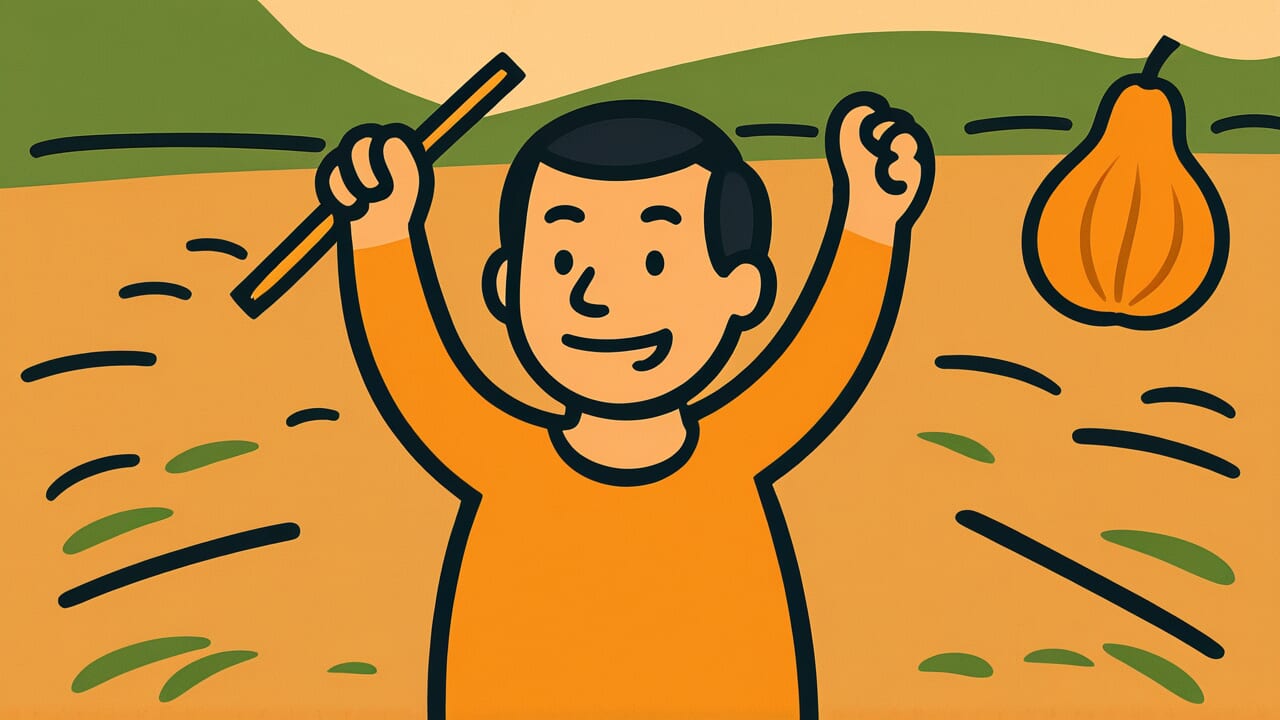How to Read “Beating straw with a gourd”
Hyō de wara utsu
Meaning of “Beating straw with a gourd”
“Beating straw with a gourd” means using an inappropriate method or tool, so no matter how hard you try, you get no results.
This proverb teaches that the right method matters more than the amount of effort. Even if you work very hard, you won’t get the results you want if your basic approach is wrong.
Like beating straw with a gourd, using an unsuitable tool just wastes time and energy.
People use this proverb when they see someone tackling a problem the wrong way. The person works hard but gets nowhere.
Today, it applies to business situations where someone uses the wrong strategy. It also fits when someone studies using ineffective methods.
The key is choosing the right method before you start working hard. This proverb reminds us how important that choice is.
Origin and Etymology
No clear written records explain where this proverb came from. But we can learn a lot by looking at the words themselves.
“Hyō” means gourd. Gourds are light and hollow inside, with smooth, curved surfaces.
“Wara utsu” means beating straw. In farming, people had to beat straw to soften it before using it.
Straw was used for many purposes, but it was too stiff to use directly. Farmers needed to pound it with wooden mallets to loosen the fibers.
Now imagine trying to beat straw with a gourd. The gourd is too light to deliver any real impact.
Its smooth, round surface can’t transfer force properly. Even if you swing it hard, the straw won’t soften.
The gourd itself might even break. No matter how hard you work, the straw stays stiff and the job doesn’t get done.
This image taught people about choosing the right tools. Through everyday farming work, our ancestors learned to warn against wasted effort.
They captured this wisdom in a humorous expression that everyone could understand and remember.
Usage Examples
- Doing calculations by hand instead of using the new software is like beating straw with a gourd
- If you want better English pronunciation but only read grammar books, that’s like beating straw with a gourd
Universal Wisdom
“Beating straw with a gourd” has survived because it addresses a fundamental human mistake. That mistake is believing “hard work always pays off.”
When we work hard toward a goal, we sometimes fall in love with the effort itself. We lose sight of whether our method actually works.
We feel good about sweating and struggling. We forget to stop and think. But reality doesn’t care how hard you try.
You can’t beat straw with a gourd, no matter how much force you use.
This proverb reveals human blindness. Once we choose a method, we can’t change course even when it’s wrong.
Instead, when we don’t get results, we think “I’m not trying hard enough.” We stick with the same failed method even more stubbornly.
This psychological trap is part of human nature across all times and cultures.
Our ancestors understood this human weakness. That’s why they used humor to give a gentle warning.
“Wait a minute, is that the right tool?” True wisdom means pausing before you work hard. It means calmly examining your method first.
When AI Hears This
When you beat straw with a gourd, two sounds happen at once. One is the sharp “smack” of the straw being hit.
The other is the deep “thump” from the gourd’s hollow chamber. These two sounds together create a pleasant rhythm for human ears.
Sound engineering shows that combining different frequencies activates the brain. This helps people stay focused even during boring tasks.
What’s more interesting is how the gourd’s size changes the sound. A large gourd makes deep, heavy tones. A small one makes high, light tones.
Workers unconsciously chose a “musical instrument” that matched their preferences and work tempo. This is basically the same as modern factories adjusting machine sounds to improve efficiency.
A wooden stick only makes a dry “thwack” sound. But a gourd adds richness and sustain to the sound.
This difference in sound quality made long, repetitive work less painful. Edo period farmers didn’t know acoustic theory.
But through experience, they understood that “tools that sound good cause less fatigue.”
Lessons for Today
This proverb teaches modern people about “working hard the right way.”
Today’s society treats “trying hard” as a virtue by itself. But this proverb gently asks a question.
“Is that really the right way to try hard?” Before competing about study hours on social media or bragging about long work hours, we need to stop and think.
Is there something you’re working on that isn’t giving results? If so, maybe you don’t need more effort. Maybe you need a different method.
Have the courage to rethink your approach. With the right tool and right method, the same effort can produce many times better results.
The important thing is not to see changing methods as “giving up.” It’s a smart decision and a sign of growth.
The flexibility to switch from a gourd to a wooden mallet is what will lead you to your goal. To move forward efficiently and surely, sometimes you need the courage to stop and choose a different tool.



Comments